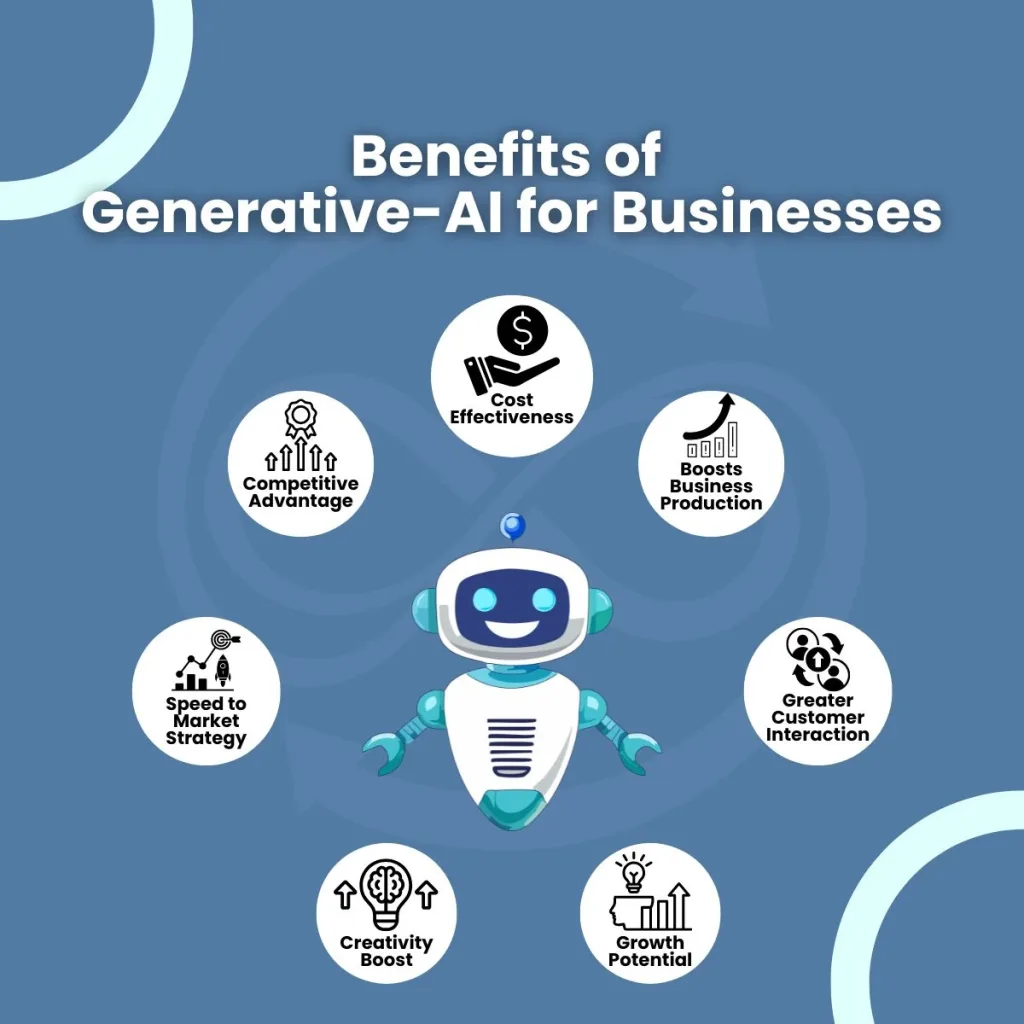Generative AI has been impacting change in the business sector by allowing companies to build, streamline and personalize experiences in ways that were never possible before. The ability to produce written content automatically, the generation of realistic images and many other features are already commercially available and are being launched at a breakneck speed. Each feature is distinct and specific. This paper attempts to find what is the business justification for a company to adopt AI and how they stand to gain from it over their competition.
Table of Contents
What is Generative AI?
Generative AI describes an area of artificial intelligence capable of creating texts, images, music, videos or even programs. For these purposes, machine learning models are used, mainly neural networks like Generative Adversarial Networks (GANs) or Transformers, which are aimed to understand and reproduce human creativity. ChatGPT, DALL·E, and Stable Diffusion are models of generative AI which are transforming many industries.
Practical Applications of Generative AI for Businesses
1. Content Creation
A lot of effort goes into developing content for a business. Generative AI can generate or write different types of content much quicker and with automation:
- Marketing Content: Generative AI writing tools can produce blog articles, social media or advertisement captions, and email campaigns very effectively targeting specific groups.
- Video and Audio: Promotion graphics or any other audio/visual tools that are needed to maintain the brand story can be produced using AI tools which emulate the company’s voice.
- Graphic Design: Original images, illustrations, and other required design components can be produced using DALL·E AI models instead of using already existing stock images.
2. Personalised Customer Experiences
Generative Artificial Intelligence makes hyper-personalization feasible. We can develop targeted content or solutions based on the analysis of a customer’s data. For instance:
- Chatbots: These are normal bots that can be merged with advanced Artificial Intelligence to help support a higher conversational capability and conversational customer support experience.
- Personalized Suggestions: AI-powered technologies can be implemented in e-commerce platforms to recommend goods to clients depending on their activities and preferences.
3. Product Design and Prototyping
The generative AI improves processes faster which speeds up the product developing processes significantly. These are some of the applications:
- Design Generation: Thanks to AI, companies can obtain numerous design documents that can later be refined and put into practice.
- 3D Modelling: AI-aided tools like CAD for 3d modelling and revolutionary design software are used in architecture and engineering especially to improve design processes.
4. Data Augmentation and Analysis
Generative AI makes it easier for data processing and augmentation, resulting in better insights. Take for example:
- Synthetic Dataset Generation: In cases when companies do not have training data, AI can generate synthetic datasets that mimic the characteristics of the original data.
- Predictive Modelling: AI can analyze past data to create models that predict business trends, sales and customer behaviour.
5. Human Resource Management
With the emergence of AI tools, the traditional methods of recruitment and employee engagement are on the cusp of getting fully transformed. For example,
- Resume evaluation: AI tools can efficiently scan and shortlist resumes based on set criteria, which saves human resource teams hours of work.
- Staff Training: Training modules can be specifically designed based on employees’ skills and rate of performance.
6. Legal and Documentation Automation
AI can indeed facilitate the creation of documents like policies and contracts very accurately while ensuring compliance is always met, all without human intervention. Businesses can take advantage of the automation of non-strategic but repetitive document drafting work to boost productivity and at the same time lower the error rates.
7. Enhanced Cybersecurity
Currently, Generative AI plays an influential role towards cybersecurity in the following ways:
- Anticipate Alarm: AI systems process network usage and preemptively notice suspicious activity that could generate an alarm.
- Protections: The bulk ordering of security patches is possible to aid against threats that gaping holes in the security pose.
Read More: The Role of AI in Modern Document Management
Benefits of Generative AI for Businesses

1. Cost Effectiveness
The removal of repetitive processes improves cost-effectiveness. Automation can save money on content or design creation, eliminating the requirement for involvement from designers or writers.
2. Boosted Business Production
Generative AI also boosts productivity in areas such as customer engagement, analysis, and documentation. Repetitive tasks can be automated allowing employees to concentrate on more strategic areas which increases productivity.
3. Greater Customer Interaction
Engagement and retention have improved substantially because of the modern marketing strategies that have been adopted. Businesses can now use chatbots to offer tailored suggestions and modify content which improves the overall user experience.
4. Growth Potential
The expansion or growth of an organization is greatly aided by the use of generative AI. For example, the AI does not limit the quality of the marketing content and products produced for different areas which means there is no specific cap on the amount of advertising content generated.
5. Creativity Boost
Generative AI gives businesses the freedom to be creative and develop innovative products and ad designs while brainstorming new concepts on how to promote them.
6. Speed to Market Strategy
Automation in prototyping and testing leads to enhanced and expedited content creation through AI, allowing businesses to provide their services and products much sooner.
7. Competitive Advantage
Businesses that started using generative AI first have a better chance of being ahead of their competitors. AI solutions in companies today permit these companies to be more productive, deliver better services, and enhance their outputs as compared to their counterparts.
Challenges in Adopting Generative AI
There are several weaknesses:
- Ethics: There is a risk of generating inappropriate or biased content during the use of AI generative systems. Thus, ethical supervision is necessary.
- Data Privacy: The collection and processing of user data must be done cautiously to meet legal requirements such as GDPR.
- Start-Up Expenses: A small business might be discouraged from adopting AI Solutions because of the types of investment needed and other infrastructure and employee training costs that have to be incurred for the AI Solutions implementation.
The Future of Generative AI in Business
As technology progresses, generative AI’s importance for businesses will grow. Thanks to the evolution of natural language processing, computer vision, and generative modelling, AI will become a critical component of innovation and operations across a variety of industries.
Read More: The future of generative AI: what businesses need to know
Conclusion
Generative AI is a trend today and will completely transform how businesses operate now and in the future. It uses automation, stimulates creative processes and enables customized delivery of services. Generative AI ensures faster growth and innovation for the business and anyone who adopts the technology will easily adapt to the businesses of the future which are solely based on global digitalization.


Pingback: AI in Cybersecurity: The Secret Weapon Against Modern Cyber Threats - SnohAI